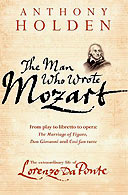
The Man Who Wrote Mozart
by Anthony Holden
Weidenfeld & Nicholson £18.99, pp224
Lorenzo da Ponte was, at various times, a Catholic priest, a gambler, a philanderer, an entrepreneur, a poet, a friend of Casanova, an enemy of the Venetian state, a teacher, a shopkeeper, a courtier and a troublemaker. The tangled yarn of his life would be worth spinning even had he not also written the libretto for Mozart's three greatest operas. In The Man Who Wrote Mozart, Anthony Holden unravels the full nine decades of Da Ponte's picaresque life, eight of which did not involve his friend Wolfgang.
There is ample pause - and scholarly appreciation - for the composition of Le nozze di Figaro, Don Giovanni and Cosi fan tutte, each of which gets its own chapter. But Holden is too good a journalist to miss the real story. Born Emmanuele Conegliano to a poor Jewish family, Da Ponte took the name of the bishop who converted him to Christianity and Roman Catholicism.
His new faith and the priesthood that followed it were a matter of financial necessity, not piety, and Da Ponte's natural skills lay more in the fields of versification and seduction. He was prodigious in both, burning a trail through patrons and reputations across 18th-century Europe.
Once his credit in the Old World had run out, Da Ponte set sail for the New. After ill-advised forays in retail and some lucky networking, he secured himself a post as the first ever professor of Italian at New York's Columbia University. Not content with having a hand in the artistic apotheosis of ancien regime Europe, Da Ponte, it turns out, also dabbled in the American dream.
But in the universe of history, genius such as Mozart's is like a sun. It forms its own gravitational system and other passing lives end up being described only in terms of how they once orbited the great composer. Holden's narrative verve spans continents and centuries. His life of Da Ponte is engrossing and bound to be definitive. It is a brilliant story. But after Mozart passes through it, the light never quite feels as bright.

